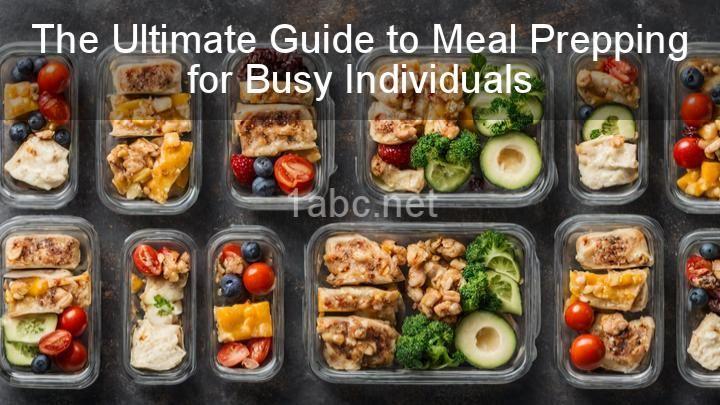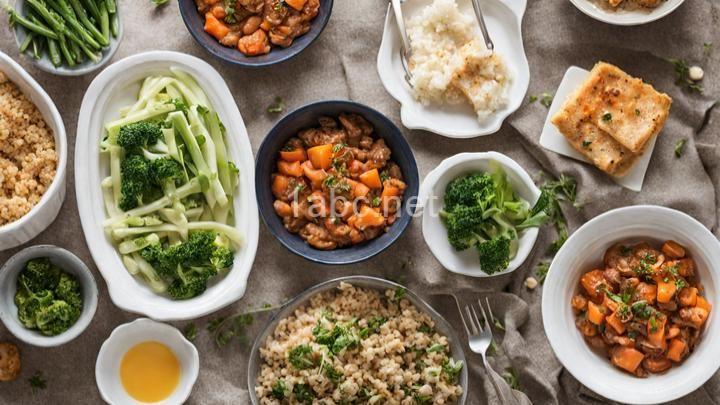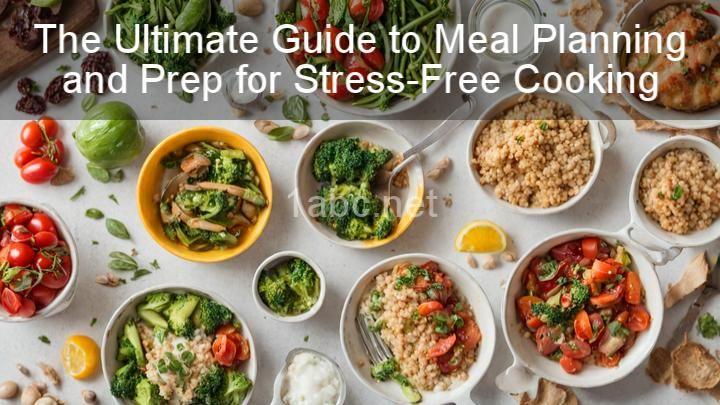The Ultimate Guide to Meal Prepping for Busy Individuals

Introduction:
Welcome to our comprehensive guide on meal prepping for busy individuals! In today's fast-paced world, finding time to cook and eat healthy meals can be a challenge. But fear not, because meal prepping is here to save the day! In this guide, we will explore the numerous benefits of meal prepping, provide you with practical tips and strategies to get started, and offer advice for different lifestyles. So let's dive in and discover how you can revolutionize your mealtime routine!
I. Why Meal Prepping is Essential for Busy Individuals:
A. Time-saving benefits:
- Allows you to prepare meals in advance: One of the biggest advantages of meal prepping is the ability to plan and prepare your meals ahead of time. By dedicating a few hours each week to prepping, you can have ready-to-eat meals waiting for you, eliminating the need to cook every day.
- Reduces daily cooking and cleaning time: Meal prepping allows you to cook larger batches of food and portion them out into individual servings or family-sized portions. This means less time spent cooking and cleaning up after each meal, giving you more time to focus on other priorities.
B. Cost-effective advantages:
- Helps minimize food waste: Meal prepping enables you to use up ingredients more efficiently and reduces the chances of food going bad. By planning your meals and portioning out ingredients, you can minimize food waste and save money in the long run.
- Allows for budget-friendly grocery shopping: By creating a meal plan and shopping list in advance, you can avoid impulse purchases and stick to buying only the necessary ingredients. This helps you make smarter shopping choices, ultimately saving you money.
II. Getting Started with Meal Prepping:
A. Planning your meals:
- Assessing your dietary needs and preferences: Before you start meal prepping, it's important to consider your dietary needs and preferences. Take into account any dietary restrictions or allergies you may have, as well as your personal taste preferences.
- Creating a weekly meal plan: Once you have assessed your needs, create a weekly meal plan that includes a variety of recipes. Plan for breakfast, lunch, dinner, and snacks, ensuring you have a well-rounded and balanced diet. Having a meal plan in place will make your grocery shopping and meal prepping much more efficient.
B. Grocery shopping tips:
- Making a detailed shopping list: Before heading to the grocery store, make a detailed shopping list based on your meal plan. This will help you stay organized and focused, preventing you from forgetting any essential ingredients. It's also a good idea to check your pantry and fridge beforehand to make sure you don't buy duplicates.
- Opting for versatile ingredients that can be used in multiple recipes: When selecting ingredients, choose versatile options that can be used in multiple recipes. For example, chicken breasts can be used in salads, stir-fries, or wraps, while vegetables like bell peppers and onions can be used in various dishes.
III. Essential Meal Prep Tools and Containers:
A. Must-have kitchen tools:
- Quality knives and cutting boards: Invest in a set of quality knives and cutting boards to make meal prep easier and safer. Sharp knives will make chopping and slicing ingredients a breeze, while durable cutting boards will provide a stable surface to work on.
- Food storage containers of various sizes: Having a variety of food storage containers in different sizes is essential for meal prepping. Choose containers that are BPA-free, microwave-safe, and leak-proof. This will ensure that your meals stay fresh and are easy to transport.
B. Choosing the right containers:
- BPA-free, microwave-safe, and leak-proof options: When selecting food storage containers, prioritize those that are BPA-free to avoid any potential health risks. Make sure they are microwave-safe so you can reheat your meals without transferring them to another dish. Additionally, opt for leak-proof containers to prevent any spills or messes.
- Different container types for different meal components: To keep your meals organized and prevent cross-contamination, consider using different containers for proteins, grains, and veggies. This will make it easier to assemble your meals and ensure each component stays fresh and separate.
IV. Preparing Meals in Advance:
A. Batch cooking basics:
- Cooking large quantities of staple ingredients: Batch cooking is a key component of meal prepping. Cook large quantities of staple ingredients such as rice, quinoa, or chicken at once. This will save you time and allow you to portion out meals for the week.
- Portioning meals into individual servings or family-sized portions: Once your staple ingredients are cooked, portion them out into individual servings or family-sized portions. This will make it easier to grab and go, whether you're preparing lunch for work or dinner for the whole family.
B. Storing meals properly:
- Storing cooked meals in appropriate containers or freezer bags: After portioning out your meals, store them in appropriate food storage containers or freezer bags. Make sure to seal them tightly to maintain freshness and prevent freezer burn.
- Labeling containers with dates and contents to ensure freshness: To stay organized and prevent any confusion, label your containers with the date of preparation and the contents. This will help you keep track of when each meal was made and ensure that you consume them before they spoil.
V. Tips for Successful Meal Prepping Habits:
A. Weekly meal prep routine:
- Designating a specific day/time each week for meal prepping: To establish a consistent meal prepping routine, designate a specific day and time each week to dedicate to this task. This will create a sense of structure and ensure that you prioritize meal prepping in your busy schedule.
- Setting aside dedicated space in your fridge and pantry for prepped meals: Make sure to clear out space in your fridge and pantry specifically for your prepped meals. This will prevent any confusion and help you easily grab your meals when needed.
B. Variety and creativity:
- Experimenting with different recipes and flavors: To avoid mealtime boredom, don't be afraid to get creative and experiment with different recipes and flavors. Try new ingredients, spices, and cooking methods to keep things interesting and exciting.
- Incorporating seasonal ingredients for freshness and variety: Take advantage of seasonal produce to add freshness and variety to your meals. Not only will this enhance the flavors of your dishes, but it will also support local farmers and promote sustainability.
VI. Meal Prepping Strategies for Different Lifestyles:
A. On-the-go individuals:
- Portable meal options like salads in mason jars or wrap sandwiches: For individuals who are constantly on the go, opt for portable meal options such as salads in mason jars or wrap sandwiches. These can be easily packed and enjoyed anywhere, whether it's at the office or during a busy day of errands.
- Quick and easy snack ideas to have on hand: Keep a supply of quick and easy snacks on hand, such as pre-cut fruits and vegetables, trail mix, or yogurt cups. These snacks can be prepped in advance and will help you stay energized throughout the day.
B. Health-conscious individuals:
- Portion control tips for maintaining a balanced diet: Portion control is key to maintaining a balanced diet. Use measuring cups or a food scale to ensure you're consuming the appropriate amount of each food group. This will help you stay on track with your health and fitness goals.
- Incorporating nutritious ingredients into meal preps: To boost the nutritional value of your meals, incorporate lean proteins like chicken or fish, colorful vegetables, and whole grains. These ingredients will provide you with the necessary nutrients to fuel your busy lifestyle.
Conclusion:
Congratulations on completing our ultimate guide to meal prepping for busy individuals! We hope that this comprehensive guide has provided you with valuable insights and practical tips to help you incorporate meal prepping into your routine. By investing a little time and effort each week, you can save time, money, and stress, all while enjoying delicious and nutritious meals. So why wait? Start meal prepping today and reap the numerous benefits it has to offer. Happy prepping!
Friendly sign-off,
[Your Name]
FREQUENTLY ASKED QUESTIONS
What is The Ultimate Guide to Meal Prepping for Busy Individuals?
The Ultimate Guide to Meal Prepping for Busy Individuals is a comprehensive resource that provides tips, tricks, and strategies for effectively meal prepping. It offers guidance on everything from planning and organizing your meals to executing the meal prep process efficiently. The guide also includes recipes and meal ideas, meal prepping tools and equipment recommendations, and suggestions on how to stay motivated and consistent with your meal prepping routine. Whether you're a busy professional, a parent juggling multiple responsibilities, or simply someone looking to save time and eat healthier, this guide is designed to help you streamline your meal prep and make it a sustainable lifestyle habit.
How can meal prepping help busy individuals?
Meal prepping can be incredibly beneficial for busy individuals. Here are a few reasons why:
- Time-saving: Meal prepping allows you to dedicate a specific block of time to prepare your meals for the week. This means that during weekdays, when you're busy with work or other commitments, you don't have to worry about cooking every day. Simply grab your pre-prepared meals and you're good to go.
- Healthier choices: When you meal prep, you have full control over what ingredients go into your meals. This means you can prioritize healthier options like lean proteins, whole grains, and a variety of fruits and vegetables. By planning and preparing your meals in advance, you can avoid the temptation of opting for unhealthy takeout or fast food.
- Portion control: When you prep your meals, you can portion them out in advance. This helps you avoid overeating and promotes healthier portion sizes. Having pre-portioned meals ready to go also makes it easier to track your calorie intake if you're trying to achieve specific health and fitness goals.
- Cost-effective: Buying ingredients in bulk and preparing meals in advance can save you money in the long run. By having pre-prepared meals ready to go, you're less likely to resort to expensive restaurant meals or impulse purchases at the grocery store.
- Reduced stress: Meal prepping eliminates the need to constantly think about what to cook or where to eat. It reduces stress by simplifying your mealtime decisions and ensuring that you always have a healthy option available.
Overall, meal prepping can help busy individuals save time, eat healthier, control portions, save money, and reduce stress. It's a fantastic tool for maintaining a balanced and nutritious diet, even with a hectic schedule.
Is this guide suitable for beginners in meal prepping?
Yes, this guide is suitable for beginners in meal prepping. It provides clear and step-by-step instructions on how to get started with meal prepping. Additionally, it includes helpful tips and ideas for planning and preparing meals in advance.
What are the main benefits of meal prepping?
Meal prepping, or preparing meals in advance, offers several benefits:
- Saves time: By planning and cooking meals ahead of time, you can save precious time during busy weekdays or when you're too tired to cook. Having meals ready to go during the week reduces the need for daily food preparation.
- Promotes healthier eating: Meal prepping allows you to have more control over the ingredients and portion sizes in your meals. You can choose nutritious and balanced options, which can lead to healthier eating habits and better overall nutrition.
- Saves money: By cooking in bulk and buying ingredients in larger quantities, you can save money on groceries. Additionally, having meals prepped and ready to go reduces the temptation to order takeout or eat out, which can be more expensive.
- Reduces stress: Knowing that your meals are already prepared can help alleviate the stress and mental burden of figuring out what to cook each day. It provides a sense of organization and allows you to focus on other priorities.
- Improves portion control: Meal prepping can help you maintain portion control and avoid overeating. By pre-portioning your meals and snacks, you can ensure that you're eating the right amount of food for your goals.
- Promotes consistency: Following a meal prepping routine can help you establish a consistent eating pattern, ensuring that you're fueling your body regularly and satisfying your nutritional needs.
Overall, meal prepping can offer convenience, time-saving benefits, and support healthier eating habits, making it an effective strategy for many individuals.



